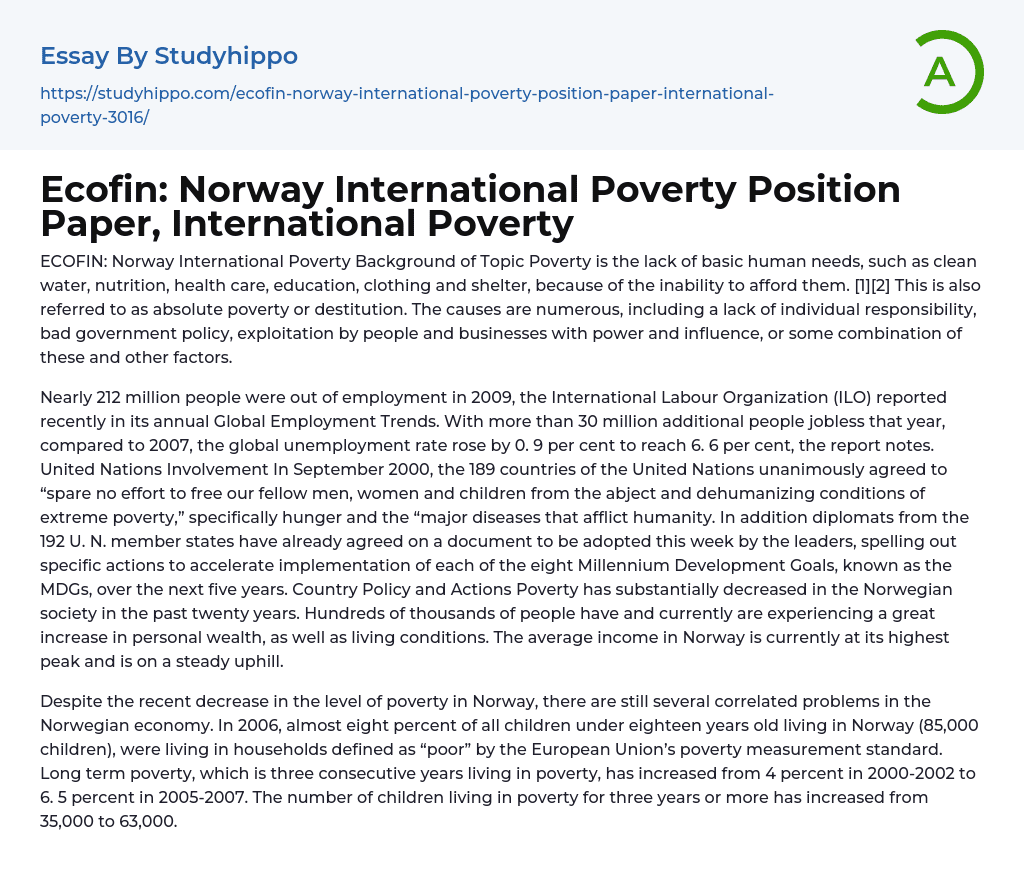Background of Topic Poverty is the lack of basic human needs, such as clean water, nutrition, health care, education, clothing and shelter, because of the inability to afford them. This is also referred to as absolute poverty or destitution. The causes are numerous, including a lack of individual responsibility, bad government policy, exploitation by people and businesses with power and influence, or some combination of these and other factors.
Nearly 212 million people were out of employment in 2009, the International Labour Organization (ILO) reported recently in its annual Global Employment Trends. With more than 30 million additional people jobless that year, compared to 2007, the global unemployment rate rose by 0. 9 per cent to reach 6. 6 per cent, the report notes.
United Nations Involvement In September 2000, the 189 countries of the United Nations unanim
...ously agreed to “spare no effort to free our fellow men, women and children from the abject and dehumanizing conditions of extreme poverty,” specifically hunger and the “major diseases that afflict humanity. In addition diplomats from the 192 U. N. member states have already agreed on a document to be adopted this week by the leaders, spelling out specific actions to accelerate implementation of each of the eight Millennium Development Goals, known as the MDGs, over the next five years.
Country Policy and Actions Poverty has substantially decreased in the Norwegian society in the past twenty years. Hundreds of thousands of people have and currently are experiencing a great increase in personal wealth, as well as living conditions. The average income in Norway is currently at its highest peak and is on a steady uphill.
Despite the recent decrease in the leve
of poverty in Norway, there are still several correlated problems in the Norwegian economy. In 2006, almost eight percent of all children under eighteen years old living in Norway (85,000 children), were living in households defined as “poor” by the European Union’s poverty measurement standard. Long term poverty, which is three consecutive years living in poverty, has increased from 4 percent in 2000-2002 to 6. 5 percent in 2005-2007. The number of children living in poverty for three years or more has increased from 35,000 to 63,000.
- Overpopulation essays
- Homelessness essays
- Hunger essays
- Dumpster Diving essays
- Homelessness In America essays
- Millennium Development Goals essays
- Activism essays
- Communism essays
- Conservatism essays
- Liberalism essays
- Marxism essays
- Nationalism essays
- Patriotism essays
- Policy essays
- Public Policy essays
- Social Contract essays
- Socialism essays
- Totalitarianism essays
- Abortion essays
- Abuse essays
- Animal Rights essays
- Animal Testing essays
- Assault essays
- Bullying essays
- Controversial Issue essays
- Crash essays
- Cyber Bullying essays
- Feminism essays
- Human Rights essays
- Immigration essays
- Inequality essays
- Poverty essays
- Prejudice essays
- Racism essays
- Torture essays
- Violence essays




